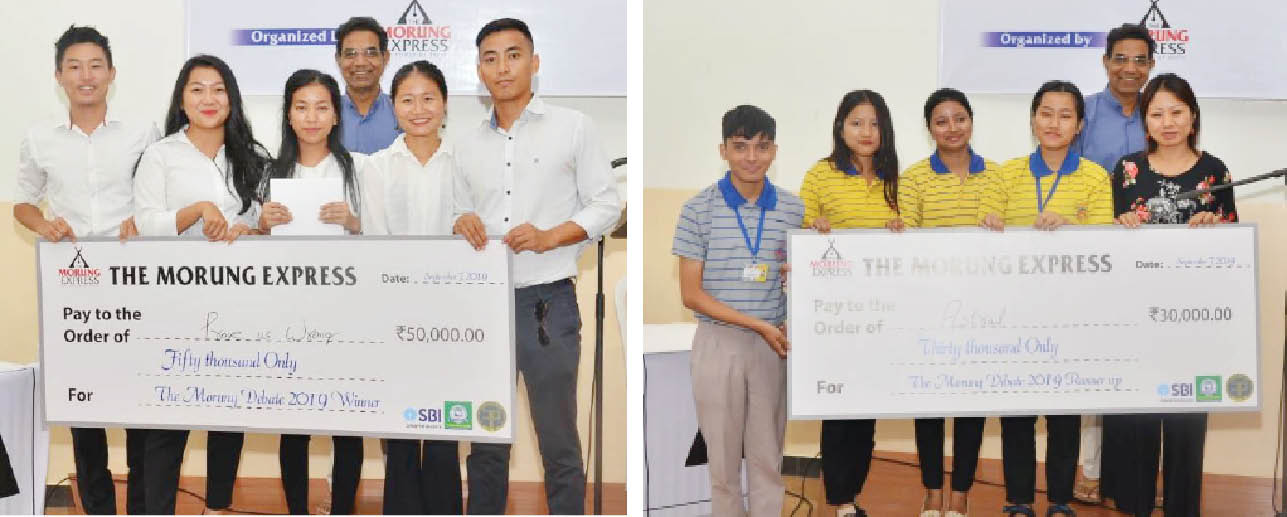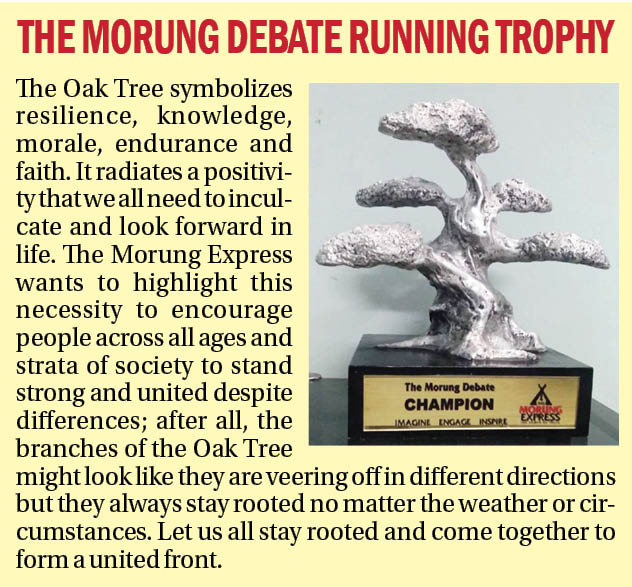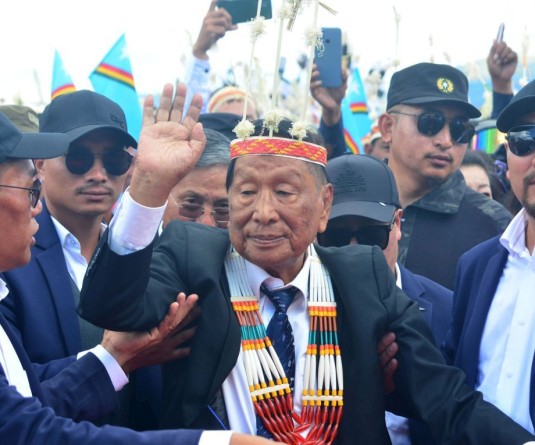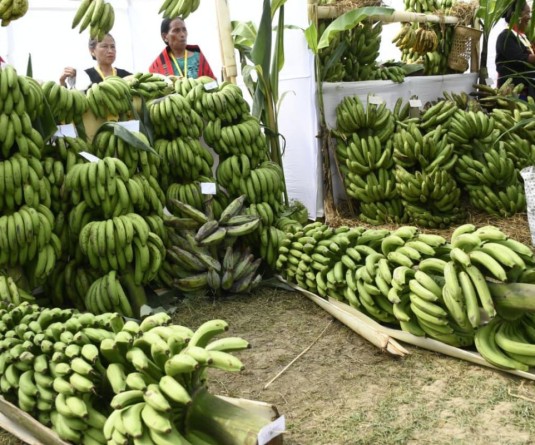'Prove Us Wrong' wins The Morung Debate 2019

(Left)Team Prove Us Wrong, the winner of The Morung Debate 2019, and (right) Team Astral, the runner up, with Father Chacko,one of the judges, after the finale held at Tourist Lodge, Dimapur on September 7. (Morung Photo by Manen Aier)
Morung Express News
Dimapur | September 7
Team Prove Us Wrong raised the bar, debating its way to the top at the finale of the 1st edition of The Morung Debate 2019 held today at Tourist Lodge, Dimapur.
At the end, none could ‘Prove Them Wrong.’
‘The Hornbill Festival Should Be Discontinued.’ The topic for the finale saw riveting arguments between teams – Prove Us Wrong for the motion and Astral, against the motion.
Prove Us Wrong started with a bold statement that while festivals in essence are promoting culture, the Hornbill Festival has turned out to be a “mockery.”
It is diluting the varied Naga culture, rather than showcasing the distinct traditional art forms, they said.
Justifying the statement, they said that the dance forms displayed by the different tribes are looking similar with each passing year, one tribe copying the dance steps of another.
While the Nagas are known for their values and simplicity, they prodded, “Have we been able to showcase this?”
Instead of organizing such events, they held that it would be better to take care of the basic necessities such as roads and electricity.

On top of that, despite being declared “a plastic-free zone,” plastic waste from the Naga Heritage village is dumped outside, without any concern that it is polluting the environment nevertheless.
They brought to fore another paradoxical situation. While, liquor is forbidden in Nagaland, it is openly sold in the festival venue.
The festival has become more of a platform for promoting western style and fashion than promoting the state’s diverse and rich indigenous cultural heritage.
“We should promote our own traditional musical instruments,” they stated.
From an economic perspective, they said “few people are profiting at the cost of the majority.”
Astral defended the assault from for the motion team, stating that Hornbill Festival is called the festival of festivals for nothing.
“Hornbill Festival is where our culture unites, because of the diversity of many tribes.” By vouching for scrapping the festival, “you are going against the promotion of our own culture.”
“Culture and tradition is what defines us. Discontinuing it, (Hornbill Festival) will affect our economy,” and Naga’s identity, they alluded.
Despite all the criticism, Hornbill Festival is an international brand, becoming a must-visit destination for travelers from around the world.
The Prime Minister of India, Narendra Modi himself said during his visit that “seeing is believing” and urged the Nagas to continue with the festival, Astral underscored, adding: The festival has tremendous scope as a platform, in terms of earning “respect for our identity and our culture.”
Further justifying their support for the festival, Astral stated that the festival stands as a beacon of hope at a juncture when Nagas are at risk of losing its cultural identity.
According to them, the purpose it serves is not only about the money or profiting, because the very essence of the festival is to promote the rich cultural heritage of Nagaland.
Young turks vs Old guard
A separate debate for the title of the Best Speaker was held on the topic – In Nagaland, do young people have a voice in politics?
The winners were Esther Sonari and Ayimnaro Jamir who both spoke against the motion.
Esther said that young people can make or break a society. However, the prevailing electoral scenario dominated by wealth and power of a candidate do not allow individuals to voice out.
Even if the youth voice out, they are often misheard and not taken into consideration.
Ayimnaro said that the “voices of the young are dead. They are gone with the wind.”
The young people of Nagaland are silenced by money, power and an easy going indifferent attitude.
They choose to remain mum, silent and ignorant, she said, while adding that is the reality of Nagaland.
“The vote that you cast, is it yours? The voices that are heard, is it yours again?” she posed.
Nokpai S Konyak, speaking for the motion said that not many young people hold positions of power but it does not imply that the Naga youth today are not politically mature.
Stating that the scope of politics is broad, he remarked that it is not only about holding positions of power, but also about criticizing and pointing out the wrongs as an individual and as organizations, such as fighting for scholarships.
Bikash Das for the motion said that the clean election campaign was started by the youth. By being journalists, by being IAS officers, have a voice by virtue of which they become a part of the greater political system and governance.
Srishti Bardhan speaking for the motion held that Akavi Zhimomi lost the election but the important thing was that he did not use money (to buy vote) while Haireusap Ngai speaking against the motion, argued that he would have won easily, if the youth stood behind.
Giving the concluding remarks, Dr Akum Longchari, Publisher of The Morung Express while thanking all the well wishers and sponsors, spoke of the need to have a “new language” of attitude and behavior.
While unity in diversity is the established notion, Dr Longchari said we can be one and diverse too.
He imagined the event evolving into a bigger platform and creating a culture of contemplative engagement.
Meanwhile, the winning team comprising of – Hinohito Z Aye, Vinotoli V Chishi, Zehovire Avi Kechu, Tiajungla Imchen and Vinoki T Kits was formed after one of the members came across an advertisement of the debate, and pitched the idea to a former college friend who assembled the team.
They described the experience as pushing their limits and helping them get out of their comfort zone.
The Groundbreakers were declared as the most promising team of the whole event.
The panel of judges for the finale included Rev Dr Ellen Konyak Jamir, Associate Professor at Oriental Theological Seminary; Zubeni Lotha, Photographer; K Ela, Director of Prodigal’s Home; Dr Asangba Tzudir, an editorial contributor to The Morung Express and Father Chacko, Director, Shalom Rehabilitation Centre.





